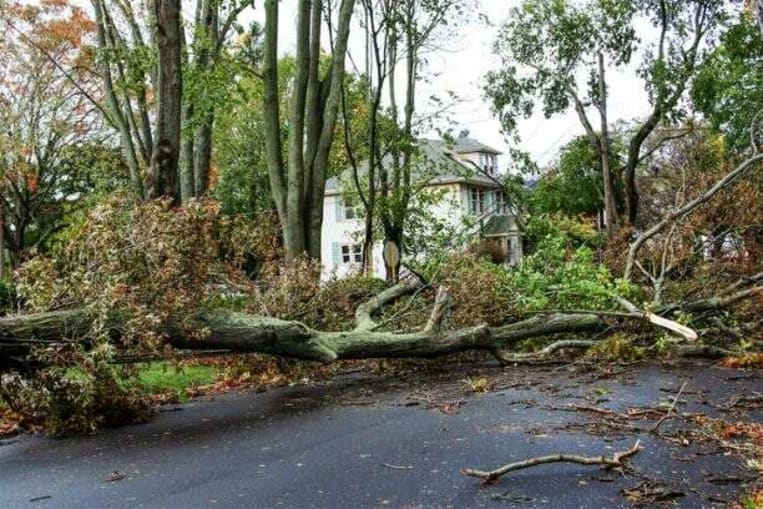
BBB Tip: Hiring a restoration contractor

(Getty)
When returning to a home that has sustained water damage, there is a strong possibility of mold damage. This must be dealt with quickly and properly in order to lessen or mitigate the problem of mold contamination.
As difficult as the repair of storm home damage can be, these stressful events often attract unscrupulous or incompetent contractors out to make a fast buck from the misfortune of others. The Better Business Bureau has the following suggestions for consumers needing to restore their homes after water damage:
- Hire only local contractors qualified in mold remediation and property restoration. To find local contractors and restorers check with the Cleaning and Restoration Association and the Restoration Industry Association for a list of contractors. When talking to a potential contractor for your restoration job, ask to see a list of references and more importantly, call them. Check with the BBB to see if they are an Accredited Business.
- Further, as a rule of thumb, be very suspicious of any contractor that contacts you out-of-the-blue or is going door-to-door to offer his services. Learn more about storm chasers.
- Act promptly. Every insurance contract requires the policyholder to mitigate damages. Do what you can safely do to mitigate your loss. Some examples include cutting off the water, moving contents (things inside your house) to a safe place and tarping the roof (but only if it can be safely done.)
- Do not be surprised if the insurance check is issued to both the homeowner and the lender that holds the mortgage. The contractor may require you to sign a statement acknowledging that the lien of the mortgage attaches to the insurance check. This is a common practice since Hurricane Katrina and helps to make sure the insurance check is being used to restore the property.
- Keep a copy of any contract you sign or any warranty papers your contractor gives you.
- Don’t be in a hurry. In areas where there has been extensive damage, it may take a while for local contractors to serve everyone with damages, resulting in an understandable frustration. The scammer understands this too and will attempt to manipulate these feelings of frustration to the homeowner’s detriment. Being pressured into making a decision that might come back to haunt the homeowner.
- Be highly suspicious of any contractor that tries to get payment for the entire job on the front end. Often times, if the homeowner pays upfront, this “contractor” is never seen again. For certain jobs, deposits are customary for particular jobs.
- People at the greatest risk from mold are people with asthma, allergies or other breathing conditions. Also, people with suppressed immune systems are at higher risk of mold infections. If there is mold in the house, it must be cleaned up and the water problem that caused it must be fixed. Controlling moisture is the most critical factor for preventing mold growth. If you don’t control the moisture, the mold will return.
- If the heating, ventilation and air conditioning system (HVAC) was flooded, the system needs to be checked and cleaned by a service technician before turning it on.
- To remove mold from hard surfaces, it is recommended that commercial products for this purpose are used. Do not mix bleach with ammonia! Open windows and doors. Wear non-porous gloves, eyewear and a N95 mask and wear it when inside the building.
- Some contracts contain a clause where substantial cancellation fees or something called “liquidated damages” are required if the homeowner decides not to use the contractor after the cancellation period referred to in the contract.
- Liquidated damages are damages that both sides agree to up front if the contract is breached. Liquidated damages clauses are perfectly legal but they are often buried in the fine print of the contract. The liquidated damages clause in the homeowner’s contract may mean that the homeowner might be liable for as much as the entire dollar amount if they try to get out of the contract after the cancellation period. If an estimate or a contract is confusing, don’t be afraid to ask the contractor to break it down into terms you can understand. Again, don’t sign anything you don’t understand or that you don’t agree with.
Read more tips on hiring a contractor.
In the unfortunate event that the homeowner has a complaint about a contractor or about the work done on their house or property, contact your Better Business Bureau or www.bbb.org in order to take advantage of BBB’s dispute resolution services. You may also want to contact the Office of the Attorney General in your state.
Disaster victims should never feel forced to make a hasty decision or to choose an unknown contractor. Start With Trust. For reliable information, lists of BBB Accredited Businesses by industry and BBB Business Reviews you can trust on local businesses, visit www.bbb.org.
Still Need Assistance?
Contact Your Local BBB
Your local Better Business Bureau can assist you with finding businesses you can trust. Start With Trust®.
Additional Resources
Let BBB help you resolve problems with a business
Research and report on scams and fraud using BBB Scam Tracker
Learn more about the value of BBB Accreditation